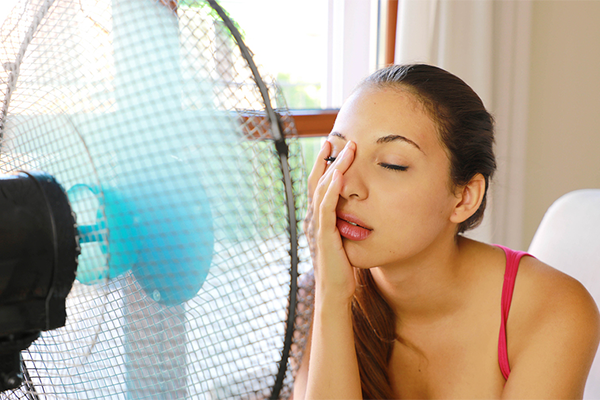The average human body can emit a range of 100 to 120 watts of energy in the form of heat. This interesting fact isn’t something we think about every day, but when our bodies are exposed to too much heat it can cause serious illnesses. This summer, Augusta University’s Office of Critical Event Preparedness and Response (CEPaR) and The National Safety Council are preparing our community for rising temperatures.
“Summer is such a wonderful, fun season, a great time to spend with family and enjoy the outdoors. But here in the South, heat related emergencies are a real hazard,” says John Ryan, Emergency Manager for CEPaR.
Those most at risk for heat-related illnesses are:
- Infants and young children
- Elderly people
- Pets
- People with heart or circulatory problems or other long-term illness
- People who work outdoors
- Athletes and people who like to exercise outdoors
- Individuals taking medications that affect sweat production
- Alcohol and substance abusers
Heatstroke
Heatstroke occurs when our ability to sweat fails to lower our body temperature and it rises quickly. Our body temperature can rise to dangerous levels in minutes causing permanent damage to our vital organs. Heat stroke is the most severe heat-related illness and can be fatal.
Symptoms of a heat stroke include:
- Extremely hot skin
- Confusion, slurred speech, or disorientation
- Seizures
Relieving a person’s excess heat is crucial for their survival and organ health. If you witness someone having a heat stroke:
- Immediately call for emergency medical help. Stay with them until care arrives.
- Move the person into the shade and place them in a half-sitting position.
- Be mindful of the humidity level. If it’s below 75%, spray the person with water and fan them quickly; if it’s above 75%, apply ice to their neck, armpits or groin.
- Do not give them aspirin or acetaminophen.
- Do not let them drink anything.
Heat Exhaustion
Heat exhaustion is a result of excessing sweating It is our bodies’ response to an excessive loss of salt and water. People who work outdoors and athletes are particularly susceptible to this kind of heat-illness.
Symptoms of heat exhaustion are:
- Severe thirst
- Excessive sweating
- Clammy or pale skin
- Fatigue
- Headache
- Dizziness
- Rapid pulse rate
- Nausea and/or vomiting
- Elevated temperature
If not monitored or treated quickly, heat exhaustion can progress into heat stroke. If you see someone who has these symptoms, urge them to stop what they are doing and:
- Move them to a shaded or air-conditioned area
- Offer them water or other cool, nonalcoholic beverages
- Apply cool wet towels to their face and/or neck
- If possible, encourage them take a cool shower
Heat cramps
Like heat exhaustion, heat cramps happen when excessive sweating depletes the body’s salt and moisture levels, typically occurring after physical activity. Low salt levels cause painful spasms or cramps in the arms, legs, or abdomen. Again, people who work outside and athletes are prone to heat cramps.
If you experience a heat cramp:
- Sit or lie down in the shade or an air-conditioned area. Don’t return to work or exercise for a few hours.
- Drink cool water or a sports drink.
- Slowly stretch affected muscles.
- If you have a history of any heart conditions, seek medical attention.
- Also seek medical attention if the spasms or cramps don’t resolve within 1 hour.
Heat Rash
Heat rash is inflammation caused by the blockage of sweat glands and the inability of sweat to reach the surface of the skin where it should evaporate. It is common in hot, humid weather.
Symptoms of heat rash are easily treated and usually resolve in a few days:
- The rash is identifiable by red, clusters of pimples or small blisters.
- In most cases, the rash appears on the neck, chest, groin, upper abdomen area, and in elbow creases.
Basic first aid can treat a heat rash.
- Keep the rash dry and uncovered.
- Ointments or creams aren’t recommended. A powder treatment should be used instead.
If you can, avoid heat-related illnesses by limiting time outdoors during hot days. Avoid the hottest part of the day during 11 a.m. and 3 p.m. If you know you’re going to be outside in high temperatures during these peak times or for long periods of time:
- Drink more fluids than usual and avoid alcoholic beverages. Sports drinks are a great way to replenish electrolytes and salt that we lose when we sweat.
- Dress in loose, lightweight clothing and a hat.
- Wear sunscreen. A sunburn affects our bodies’ ability to cool down.
- If you’re exercising or working, pace yourself. Slow your rate and take breaks.
“Knowing the signs and symptoms, as well as key actions to take in the event of an emergency are very important topics to stay refreshed on, and share with the ones you love,” Ryan shares. “We hope everyone has a safe summer.”





